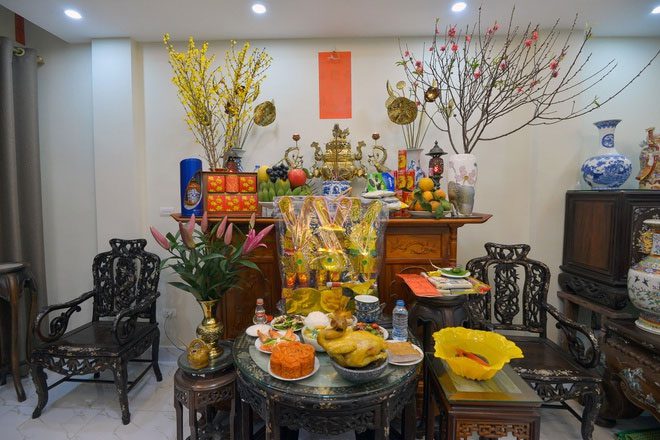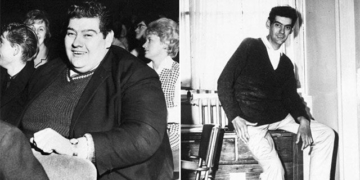The Worship of the Kitchen Gods is a beautiful cultural practice of the Vietnamese people. However, it is essential to understand the true significance of this custom for the offerings to be complete and meaningful.
When to Worship
The worship of the Kitchen Gods (Ông Công Ông Táo) is a long-standing traditional practice among the Vietnamese. Cultural expert Dr. Nguyễn Thị Hồng suggests that families should not perform the worship too early, and absolutely avoid doing so on the full moon of the last month of the lunar year. Instead, it is recommended to perform the worship between the 20th and 23rd of the last month. According to folk beliefs, at noon on the 23rd day of the last month, the Kitchen Gods have flown to heaven. Therefore, the offerings should be completed before this time.
Where to Worship
Many people believe that Ông Công, the land god, should be worshipped at the main altar in the house, while Ông Táo, who oversees the kitchen, should be worshipped at the stove. However, spiritual research experts indicate that this practice is incorrect. Traditionally, all these deities should be honored at the family’s main altar. Moreover, the kitchen is a place for cooking and not for worship. The offerings for the 23rd day of the last month should be prepared in the cleanest and most solemn area of the house.
Preparing Offerings

Depending on each family’s conditions, the offerings do not need to be overly elaborate.
When performing the worship of Ông Công and Ông Táo, families usually prepare a savory spread that includes a plate of rice, a plate of salt, boiled pork, mushroom soup, a plate of mixed stir-fried vegetables, Vietnamese sausage, sticky rice with gac fruit, fruits, and fresh flowers. The necessary offerings include three sets of clothing, hats, and shoes along with a paper horse or three carp and gold paper. Depending on their circumstances, families can prepare offerings that do not need to be overly elaborate.
Burning Paper Money
Cultural researcher Trịnh Sinh advises that when worshipping Ông Công and Ông Táo, householders should not burn too much paper money. Additionally, during this time, many families are willing to spend millions of Vietnamese dong to purchase gold paper for burning. They believe that offering a full and high spread will allow the Kitchen Gods to grant them many blessings and overlook their misdeeds throughout the year. However, this not only wastes money but also has no benefit and negatively impacts the environment.
Currently, in the offerings for Ông Công and Ông Táo, many families spare no expense in preparing an elaborate spread, purchasing abundant paper money, and even acquiring paper airplanes or mobile phones as “vehicles” to send Ông Táo back to heaven. According to feng shui expert Phạm Cương, this is a misconception that deviates from tradition.
“According to ancient customs, Ông Công and Ông Táo only ride carp, so worshipping them with gold paper representing modern vehicles like airplanes or phones reflects a misunderstanding in the perception of some people.
The act of worship in general, and the worship of Ông Công and Ông Táo in particular, reflects the sincerity and devotion of the householders towards the deities. The offerings should depend on the conditions of each household and be done correctly; it is not necessary for them to be luxurious or expensive to be considered good,” emphasized expert Phạm Cương.
In addition to properly performing the worship of the Kitchen Gods, cultural researchers also advise the public to adopt a civilized attitude towards the environment. It is suggested that people should only buy a small, neat set of hats and clothes along with a little gold paper, rather than competing to purchase oversized and excessive gold paper offerings, which waste resources and harm the environment.
Praying for Wealth and Prosperity
The worship on the 23rd day of the last month signifies sending Ông Công and Ông Táo back to heaven to report on the household’s good and bad deeds throughout the year. Therefore, praying for wealth and prosperity is not advisable. Families should only pray for the Kitchen Gods to report the good deeds of the year, asking that any shortcomings be minimized.
Releasing Carp
After the worship, families usually proceed to burn the gold paper and then scatter the ashes into rivers or lakes, combined with releasing the carp that were offered to Ông Táo. However, some families often stand on high bridges to release the carp into the rivers, which can lead to the fish dying, contradicting the meaning of releasing the vehicle of Ông Táo.
Cultural experts emphasize that when conducting the ritual of releasing carp, people need to do it correctly and sincerely, rather than following trends.
When releasing carp, the process should be performed quickly within a short time from when the fish is purchased to prevent them from dying before being released; it is unnecessary to choose an auspicious time to release the fish, as that is superstitious.
When releasing carp, people should not dump the entire bucket of fish into the pond or lake; they should avoid throwing the fish still in plastic bags into the water, as this can cause the fish to die and severely harm the environment.
Additionally, families should not release carp just because it is a trend; the worship should primarily be heartfelt. If a family is near a location where they can release the carp, they should do so; otherwise, symbolic worship should be performed to avoid releasing fish in dangerous locations, which could lead to slips and falls as has occurred in previous years.
How to Worship Ông Công Ông Táo in Rented Homes?
Many families who rent homes often wonder if they need to worship Ông Công Ông Táo. According to some feng shui experts, if one does not perform the housewarming ceremony when renting, it is not necessary for tenants to worship Ông Công Ông Táo on the 23rd day of the last month. However, feng shui experts also add that worship is a spiritual matter; the Vietnamese often say “having worship is sacred, having abstentions brings blessings,” so whether to worship or not depends on the wishes and circumstances of the tenants.


















































